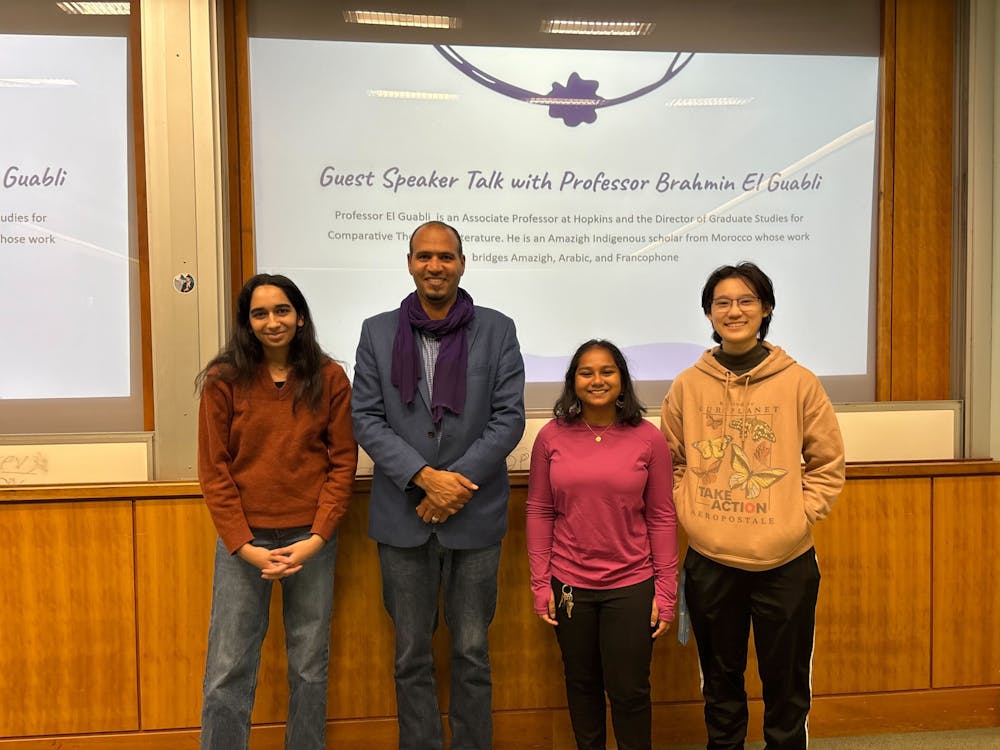On Nov. 11, the Students for Health Humanities (SHH) organization hosted a speaker event featuring Professor Brahim El Guabli. An associate professor at Hopkins and director of graduate studies for Comparative Thought & Literature, El Guabli is an Amazigh Indigenous scholar from Morocco who has published two books — one that revolves around archives and state violence and one on deserts.
In an interview with The News-Letter, Treasurer Anahat Goraya reflected on her experience organizing the event and explained the purpose of inviting El Guabli.
“It’s just trying to look at healthcare issues we’re facing right now from a more interdisciplinary lens. We have Professor [El] Guabli coming here, and he brings a lot of experience and different perspectives,” Goraya said. “When we find [a topic] interesting that club members would benefit from learning from it, we like to draw upon it.”
After opening statements from the co-president of SHH, Gaayathri Nadarajah, El Guabli began the event with an introduction of who he is and what his work centers around.
El Guabli describes his work as “very interdisciplinary,” citing the subjects he agglomerates (including comparative literature, environmental studies and Indigenous studies) and how his work bridges Amazigh, Arabic and Francophone.
The talk then transitioned into a discussion of El Guabli’s research, including his books Moroccan Other-Archives and Desert Imaginations. In particular, El Guabli discussed the influences of his first book, Moroccan Other-Archives.
“I was really struck by the fact that the political prisoner — whose works I was studying at the time in Morocco — [that] there was a period of time called the Years of Lead.”
The Years of Lead refers to a period of time between the 1960s and the 1980s during the rule of King Hassan II. This era was a time that was characterized by state violence and repression, which was meant to target political dissidents and pro-democracy activists.
El Guabli then went on to explain what the period was, discussing its impacts and how it continues to shape Morocco’s collective memory, literary production and national identity. Following this, the professor cited one inspirational source of his research, a memoir titled Tazmamart: 18 Years in Morocco's Secret Prison, which his students in the class “Illness Across Culture: Ethics of Pain in Literature & Film” had read during the fall semester.
The discussion then transitioned into the relationship between the horror of stories in political imprisonment narratives and their reinterpretation through moral or religious frameworks.
In recent years, El Guabli has begun to consider illness, pain and ethics in conversation with one another. Specifically, he noted that cancer has increased due to growing knowledge of the topic. El Guabli referenced this in relation to how people have been willing to write memoirs and other literature to erase the stigma of medical diagnosis. As health humanities is such a large field, he encouraged students to approach it from an expansive cross-cultural perspective.
“You can’t just think about North Africa or the Middle East, you must think broadly, to master the language, the theories, what other people are doing,” he said. “How is other literature or other films [...] navigate the question of illness, the ethics of the medical field, the ethics of pain, where — in some societies — pain has value.”
Building on this idea, El Guabli reflected on how medical ethics ultimately raise questions about morality and the human condition.
“The main question is: ‘How do you prevent death?’” he said. “At the end, [...] the line is between life and death, and this requires asking some very important questions for people.”
Moreover, El Guabli emphasized how context, culture and perspective are essential in understanding health and mitigating illness. As an example, he cited the impact of colonialism and specifically the American impact on the rest of the world.
“How did colonialism impact the health practices and the notions of illness and treatment in other places? [...] We might think [that] there is only one way of doing things or looking at things from our American context,” he said. “This is the most advanced country [for] medicine in the world. Let’s not forget that. But is it the only way in which [we] practice health? Or is this just an exceptional way that really represents the most advanced society — sophisticated healthcare?”
By challenging students to think beyond traditional boundaries of medicine, El Guabli underscored the necessity of integrating cultural understanding and humanistic inquiry into conversations about health, illness and ethics.
The session then ended with a question-and-answer session from the audience. One student asked what the professor sees in the future of the humanistic studies of health. In response, El Guabli expressed optimism, noting that as global awareness of ethical and cultural questions surrounding medicine grows, health humanities will continue to expand as an essential field that bridges science and human experience.
“[Organ giving] was not a question [in Morocco] 20 years ago,” he said. “The field is getting complicated and the questions that are asked in other contexts are definitely making their way into that area.”
In an email to The News-Letter, sophomore Shelley Lin discussed the impact of El Guabli’s presentation and the unique perspective he offered.
“I thought his research was pretty cool and something I hadn’t really thought about before,” she wrote. “I liked when he talked about the Moroccans and how they viewed getting a cold as being hit by the cold, and how he said when they get [sick,] it could be because they believed they would get sick.”





